
Recently on Cyclingnews.com |
Tales from the (cobbled) peloton, April 14, 2007 - Page 2 of 2
A breakdown of Hell: The pavé of Paris-Roubaix
...Continued from Page 1
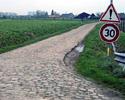
|
Secteur 14 - Tilloy à Sars-et-Rosières
Length: 2.4 km
Rating: ***
Km from start: 188
Km from finish: 71.5
Another fairly long secteur, only just over a kilometre after the last one, thankfully though, for those starting to suffer, it's pretty smooth and almost completely flat. Shaped like a massive letter 'L' the course heads across to the middle of some fields before turning ninety degrees and makes for the small village of Sars-et-Rosières where once again civilisation returns and riders can rest in the knowledge that they have a whole four kilometres to prepare for the next ordeal.
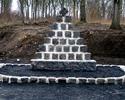
|
Secteur 13 - Beuvry-la-Forêt à Orchies
Length: 1.4 km
Rating: ***
Km from start: 194.5
Km from finish: 65
Newly introduced for this year, discovered and prepared by les Amis de Paris-Roubaix over the winter, this secteur has been dedicated to 1985 and 1991 winner, Francaise des Jeux directeur sportif Marc Madiot. To commemorate its inclusion in the race course this year, a monument in the shape of a pyramid of cobblestones has been built at the start of the secteur.
Instead of following the straight road into Orchies, the course takes a left fork just outside the town and follows the Chemin du Moulin in an almost semicircular arc to rejoin the main road in the centre of the town. The surface when Cyclingnews visited in February was pretty smooth, but very muddy - there may well be plans to clear some of this mud before the race.
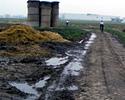
|
Secteur 12 - Orchies
Length: 1.7 km
Rating: ***
Km from start: 199.5
Km from finish: 60
This secteur is actually divided into two parts; the Chemin des Prières, and the very aptly named Chemin des Abattoirs. The first part runs in a mostly easterly direction until it turns to asphalt at a small group of houses - and a large bar. It then turns left ninety degrees to take a northerly path. The beginning of the secteur is quite muddy, but the surface is, for the most part pretty good, except for the last few hundred metres where the cobbles become quite broken up.
This is where the course runs very close to the A** Autoroute, and it is not unknown for fans to abandon their cars on the hard shoulder and run up the embankment to watch the race - something that the French Police strongly disapprove of!
Secteur 11 - Auchy-lez-Orchies à Bersée
Length: 1.2 km
Rating: ***
Km from start: 205.5
Km from finish: 54
Shortened to just 1.2 km (it was previously 2.6 km) due to the second half of the previously used secteur being proclaimed unusable (don't worry, the missing 1.4 km have been replaced by the new Secteur 13 - above!), what remains is still no laughing matter. Despite being pretty smooth, almost the entire secteur is a false flat rising gently nearly all the way so it will again test the resolve of those who aren't feeling too strong. We're now at over 200 km, which is the point where a semi-classic would end, it's this point that sorts the men from the boys!
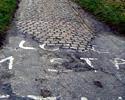
|
Secteur 10 - Mons-en-Pévèle
Length: 3 km
Rating: *****
Km from start: 211
Km from finish: 48.5
This secteur was reintroduced for the 2006 race after a gap of a few years and had an immediate impact. The second of only three five star rated secteurs, this was the point where George Hincapie's steerer tube snapped, causing him to crash and badly injure his shoulder, costing him not only a result in that race, but his entire spring campaign. Mons-en-Pévèle was also where this correspondent spent a day as a convict of the road with les Amis de Paris Roubaix, clearing the surface of the worst of the mud and water - I can assure you that these two incidents are not linked in any way!
It begins with a slight uphill part before descending gently for a kilometre or so whereon it turns left ninety degrees and continues straight until it joins the main road just north of Mons. The surface is very uneven, particularly in the early part where the Hincapie incident occurred. After the left hand bend, the cobbles are much more plat (flat) as they would say in this area, but still pretty heavy going.
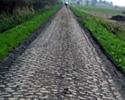
|
Secteur 9 - Mérignies à Pont-à-Marcq
Length: 0.7 km
Rating: **
Km from start: 217
Km from finish: 42.5
Just two stars for this one, it's only 700m long and the surface is in really good condition. Because of this it shouldn't really cause anyone any problems, other than serve to break up the rhythm and add to the accumulative effect of so many cobbles.
Secteur 8 - Pont-Thibaut à Ennevelin
Length: 1.4 km
Rating: ***
Km from start: 220
Km from finish: 39.5
Another completely flat secteur, so soon after the previous one. This one zigzags across the fields between the two villages without ever becoming too challenging to fresh legs, but tired ones will start to feel it on the last few hundred metres where the hitherto good surface deteriorates and the crown of the road becomes the only vaguely smooth line. This last part is where the big assertive riders will be making their presence felt as lesser and less confident riders will be forced to ride in the wheel tracks at the side - a much harder route.
Secteur 7 - Templeuve - L'Epinette
Length: 0.2 km
Rating: *
Km from start: 225
Km from finish: 34.5
Hardly worth mentioning, this one. The course approaches a T-junction, but instead of taking the asphalted main road they cut the corner and take the diagonal cobbled track across. It's not that smooth, but it's so short that unless it's slippery and causes a crash this will cause no problems at all.
Secteur 7 - Templeuve - Moulin-de-Vertain
Length: 0.5 km
Rating: **
Km from start: 226
Km from finish: 33.5
Yes, we've just had Secteur 7, but that was so short and this one is so close that they are combined. It's pretty flat, and almost as short as the other part, but as it passes some in-use farm buildings it's pretty muddy.
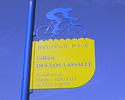
|
Secteur 6 - Cysoing à Bourghelles
Length: 1.3 km
Rating: ****
Km from start: 232.5
Km from finish: 27
Like the previous secteur, this is two in one. Unlike the previous secteur, this one is a serious challenge. The course leaves the town of Cysoing and joins the fairly well surfaced pavé. This smooth start may lure the unwary into a false sense of security, because after a few hundred metres the surface goes from cobbled road to rock garden in the space of a few turns of the crank. It does improve before the end, but never gets really good again.
Previously, the course went straight on over a brief bit of asphalt before becoming cobbled again (which is now part of the next secteur), but in 2006 the course was changed to turn right, continuing on the cobbles to the village of Boughelles. That year, Vladimir Gusev crashed quite spectacularly at this point, bringing down Alessandro Ballan with him.
This part of the country is about as close as you can get to Belgium without actually being in it, for this reason, as well as the fact that we are now getting close to the finish, the Belgians flock to the next three secteurs - literally - by the lorry load. There will also be at least one - maybe two - beer tents along here to keep them all well lubricated.
This secteur is dedicated to 1992 and 1993 winner Gilbert Duclos-Lassalle.
Secteur 6 - Bourghelles à Wannehain
Length: 1.1 km
Rating: ****
Km from start: 235
Km from finish: 24.5
After a few hundred metres of asphalt, which is basically enough to get around the block, the course leaves Bourghelles on the cobbled road that used to be the last part of the old secteur 6 - they used to tackle this in the opposite direction. The course turns right and then follows a right hand arc to rejoin the main road the we just left.
The terrain is completely flat, but the surface is pretty uneven, although work was carried out earlier this year to clear a lot or cinders and gravel from the final part.
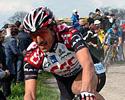
|
Secteur 5 - Camphin-en-Pévèle
Length: 1.8 km
Rating: ****
Km from start: 239.5
Km from finish: 20
A few kilometres on from the last secteur, across the TGV (Train Grand Vitesse) line - the building of which has been responsible for the loss of so much of the local pavé - the course takes a sharp left-hand corner and the secteur starts immediately. The secteur is almost completely flat as it passes between farm buildings - flanked by thousands of passionately drunken Belgian fans - and heads out into the fields. After almost a kilometre the course takes a sharp right hand turn and makes its way across to the village of Camphin.
Not one of the longest secteurs, but the vagaries of the surface mean that it earns four stars. Parts of it are very well surfaced, but others are broken up really badly by the regular farm vehicles that use it. Unlike other badly surfaced parts of the course, this doesn't really have a smooth line, so powerful riders do well here and anyone still with the front group who isn't as strong as the others may start to fade.
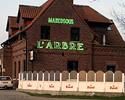
|
Secteur 4 - Carrefour de l'Arbre
Length: 2.1 km
Rating: *****
Km from start: 242.5
Km from finish: 17
Along with the Trouée d'Arenberg, this secteur sums up what this race is all about. Starting fairly anonymously behind a group of farm buildings the track winds its way alongside a wood before pitching into the open and heading almost dead straight across the fields. With almost a kilometre to go it turns left ninety degrees and heads directly towards the point that gives it its name; the Arbre Junction. This, quite simply is a junction of roads which has a bar on it called l'Arbre (the tree). In the days when the race was less fashionable, this bar used to only open one day a year, a requirement to keep its licence, but nowadays it's a thriving bar and restaurant, keen to associate itself with the chaos that passes its door each April.
This secteur, like the previous one has a very varied surface; it begins fairly benignly as it skirts the wood, but as it moves into open country it deteriorates into a series of potholes peaks and ridges, forcing riders to concentrate to pick the best line. Once it turns the corner and heads directly for l'Arbre, things improve again and the rest of it is "relatively" comfortable.
We're still right on the border with Belgium here, and legions of them will come to this point to try and drink l'Arbre dry. The last bend typically sees riders come through a sea of Flandrian and Belgian flags and the noise is deafening - particularly if its one of their own, like Boonen or Hoste.
Over the last few years this secteur has proved decisive for some. Last year it was the point where Fabian Cancellara's power finally broke the resolve of Vladimir Gusev, and the year before it was where defending champion Magnus Backstedt found that he couldn't hold onto the accelerations of Tom Boonen much longer. This is the last difficult part of the course, so someone will always try something.
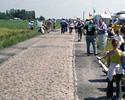
|
Secteur 3 - Gruson
Length: 1.1 km
Rating: **
Km from start: 244.5
Km from finish: 15
This secteur used to form the last part of the previous one until it was made one in its own right for the 2004 race. It's an arrow straight, almost completely level road, which is pretty evenly surfaced, hence only two stars. It leaves the main road adjacent to the Arbre bar - literally only a few metres from the finish of the last cobbles - and heads straight for the village of Gruson.
These cobbles were used in the 2004 Tour de France stage 3 between Waterloo and Wasquehal.
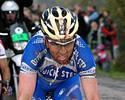
|
Secteur 2 - Hem
Length: 1.4 km
Rating: *
Km from start: 251
Km from finish: 8.5
The last real cobbles of the race are not much of a challenge. The secteur snakes its way towards the town of Hem in an uneven and irregular manner, but because of its regular use by regular traffic the road has been widened at the sides with asphalt. Thanks to this, and despite the fact that it is badly broken up in places, riders tend to hop from one side of the road to the other, avoiding the worst of the pavé. If this were not possible then it surely would be given a higher rating than one star.
That's not to say that this secteur cannot be decisive. In 2004, a soon to be retiring Johann Museeuw suffered a puncture on this stretch, and with no teammates at this late stage of the race to take him back to the leaders it cost him the chance to sprint for a record equalling fourth victory.
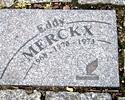
|
Secteur 1 - Roubaix, Espace Charles Crupelandt
Length: 0.3 km
Rating: *
Km from start: 258
Km from finish: 1.5
Not really genuine pavé, this secteur was created in 1996 to celebrate the race's centenary. Running down the centre of the wide boulevard of Avenue Alfred Motte, the recently nicknamed Chemin des Géants is more like the kind of cobbles you'd find in your local High Street than in the Hell of the North.
This last secteur, which ends just at the entrance to the famous old velodrome, is really there as a monument to the race, as well as one last little buzz to remind them of what they've just covered over the preceding kilometres, and to let them know that their day of toil is almost at an end. There's no chance to attack here really, riders who ride together will be watching each other like hawks as they approach the track, riders who arrive here alone will try and savour the moment.
As well as the High Street style cobbles, the surface is dotted with a specially engraved stone for each of the race's winners.
Total calvary for the day: 52.7 km!
Photography
For a thumbnail gallery of these images, click here
Images by Ben Atkins/Cyclingnews
- Typical Pavé du Nord riders will have to deal with 52.7 km of this stuff.
- You don't say! Some like to state the obvious.
- It begins. Troisvilles is a relatively gentle introduction though.
- Once it has turned the corner this secteur heads gently uphill.
- Viesly à Quiévy Secteur 27 is very muddy.
- Secteur 26 looks pleasant enough at this point...
- ...but it goes on a long time and gets harder as it goes.
- Exposed there's no protection from the wind around here
- Not much climbing in this race but plenty of false flats to deal with.
- More false flats on the Verchain-Maugré à Quérénaing secteur.
- The course leaves Quérénaing with a gentle descent.
- But is mostly flat before it descends for its final part.
- Maing à Monchaux-sur-Ecaillon is actually quite well surfaced.
- Haveluy à Wallers can be fairly smooth.
- But the surface varies greatly and it's pretty long.
- The legendary Trouée d’Arenberg this path at the side is out of bounds to riders.
- Arenberg is dead straight and very uneven!
- The Wallers secteur crosses the new railway.
- The old railway has gone leaving Gibus' bridge without a top.
- The twin water towers dominate the Hornaing à Wandignies - Hamage secteur.
- It's not badly surfaced but it's very long.
- Warlaing à Brillon starts smooth but deteriorates pretty quickly.
- Tilloy à Sars-et-Rosières is fairly long and features a right angle bend at around halfway.
- The new secteur at Beuvry-la-Forêt features a nice new sculpture.
- The new secteur is dedicated to Marc Madiot and will probably be cleaner than this for the race.
- The first part of the Orchies secteur sees a lot of use from farm traffic.
- Auchy-lez-Orchies has been cut to 1.2km this year because the second part was deemed unrideable.
- Mons-en-Pévèle looks innocent enough but last year it broke Hincapie's steerer tube!
- The Cysoing secteur is dedicated to 1992 and 1993 winner Gilbert Duclos-Lassalle.
Images by Fotoreporter Sirotti
- Fabian Cancellara on the Camphin-en-Pévèle secteur last year.
Images by Ben Atkins/Cyclingnews
- L'Arbre the bar that gives this secteur its name and character.
- The almost arrow straight Gruson secteur as used in the 2004 Tour de France.
Images by Mitch Clinton/www.clintonphoto.com
- Museeuw and Van Petegem on the pavé in Hem during the 2004 edition.
Images by Ben Atkins/Cyclingnews
- The final secteur - le Chemin des Géants lists all the riders who have been victorious here.
- None are more "Géant" than this bloke le Gitan won four times - more than anyone else.
